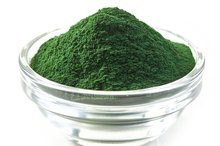What Are the Dangers of Chlorella?
The superfood chlorella is one of the fastest growing plants on Earth. This one-celled, freshwater algae boasts protein and antioxidants such as chlorophyll, the compound that makes plants green and that is often taken as a supplement to address gastrointestinal distress, promote wound healing and potentially deter cancer. As with any supplement, chlorella is not regulated by the U.S. Food and Drug Administration and comes with side effects and quality concerns.
Why Use Chlorella
You can purchase chlorella in tablet, powder or concentrated liquid. Add it to smoothies, take it like a pill or mix the powder with flour for baked goods. Chlorella is 65 percent protein, with all of the essential amino acids, and its high chlorophyll content makes it acid-reducing, which means it has use as a potential detoxifier. Chlorella is a rare plant-based source of vitamin B-12 and offers enzymes, minerals and vitamins. Vegan athlete and author Brendan Brazier touts the merits of chlorella's high antioxidant content in reducing cellular damage caused by free radicals.
Variability of Quality
Side Effects of Chlorella Supplements
Learn More
With all these benefits, it's hard to imagine that you could do yourself harm by taking chlorella. Because supplements like chlorella are not regulated by the FDA, you can't always be sure of their quality. Supplement manufacturers are not required to prove their concentration or safety, as long as they don't claim specific benefits on the label. When purchased in tablet form, chlorella is highly processed and may have had some nutrients removed. The antioxidant and protein content may vary widely among brands and even among batches made by the same manufacturer. You can't be certain that the chlorella you purchase is pure.
Side Effects
If you have an allergy to chlorella, you may experience rashes or itching. Some people's skin is more sensitive to the sun when taking chlorella. Nausea or vomiting after consuming chlorella supplements is also a potential side effect. It may trigger asthma symptoms as well. If you are on blood-thinning medication, be wary of chlorella, which is high in vitamin K and could compromise your clotting abilities. If you are pregnant, breast-feeding or sensitive to iodine, it's best to avoid chlorella.
Accuracy of Claims
Does Taking Chlorella Make You Feel Tired?
Learn More
A 2001 review published in "Alternative Therapies in Health and Medicine" determined that using chlorella has the potential to reduce high blood pressure, positively affect cholesterol levels, help with wound healing and enhance immunity. The researchers noted that chlorella may be particularly helpful to those with fibromyalgia, hypertension or ulcerative colitis, but they called for more research to substantiate claims of its benefits. Many of the claimed benefits of chlorella as a supplement have not been proved by medical science, but the nutrient content could be beneficial to those with deficiencies, notes the American Cancer Society. Use of chlorella to treat cancer has not been conclusively shown in scientific studies, and relying on it instead of conventional treatments could be harmful.
Related Articles
References
- Linus Pauling Institute: Chlorophyll and Chlorophyllin
- American Cancer Society: Chlorella
- Alternative Therapies in Health and Medicine: A Review of Recent Clinical Trials of the Nutritional Supplement Chlorella Pyrenoidosa in the Treatment of Fibromyalgia, Hypertension, and Ulcerative Colitis
- Cosmopolitan: What's the Deal With Chlorella?
- RaySahelion.com: Chlorella Supplement Health Benefit and Side Effects, Review of Medical Uses and Influence on Immune System
- Platelet Disorder Support Association: Vitamins and Other Supplements
- HerbWisdom.com: Chlorella (Chlorella Pyrenoidosa)
Writer Bio
Andrea Cespedes is a professionally trained chef who has focused studies in nutrition. With more than 20 years of experience in the fitness industry, she coaches cycling and running and teaches Pilates and yoga. She is an American Council on Exercise-certified personal trainer, RYT-200 and has degrees from Princeton and Columbia University.









